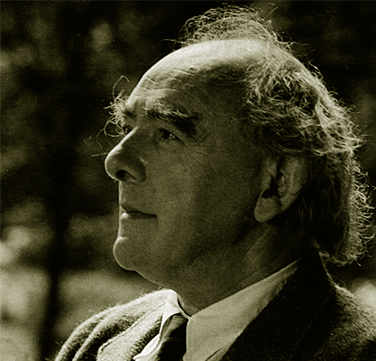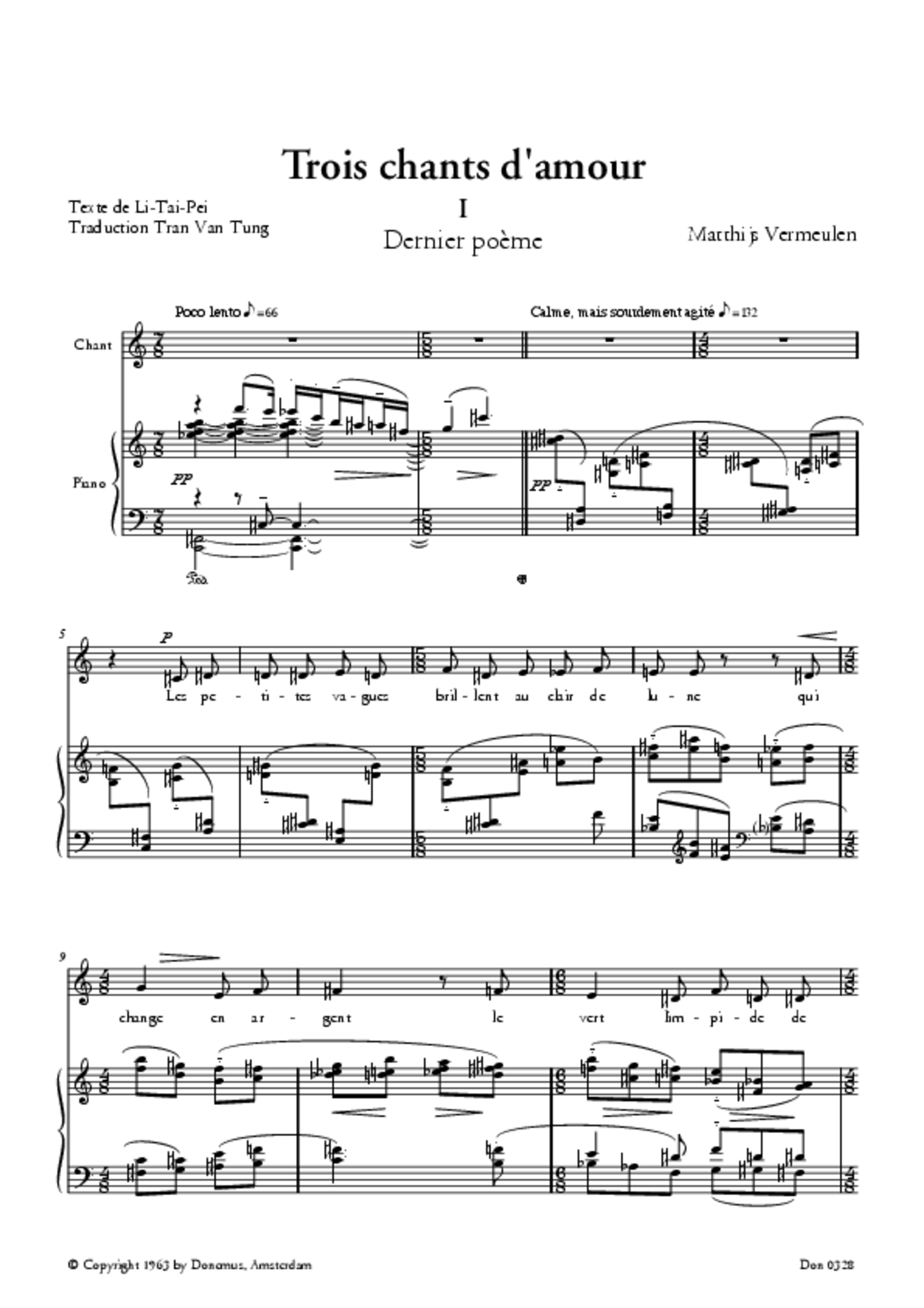MATTHIJS VERMEULEN
Componist, schrijver en denker

TROIS CHANTS D'AMOUR for mezzo-soprano (or tenor) and piano (1961-62)
Dernier poème (Li-Tai-Po, 701-762)
La maison dans le coeur (Tu Fu, 712-770)
Hymne (Charles Baudelaire, 1821-1867)
Vermeulen chose the text of his Trois chants d'amour for very personal reasons. The poem of the second song reflects the transition from a longing for death to a new, unexpected desire to live, a change of mood that Vermeulen went through himself in the autumn of 1945. When at the time he ended his diary Het enige hart (The Only Heart) in which – mourning the loss of his wife and child – he had arrived at a definite perception of life, he was convinced that he was about to die. His love for Thea Diepenbrock overwhelmed him entirely and brought him back to this world, unconditionally and unavoidably.
La maison dans le coeur on texts by the Chinese poet Tu Fu expresses this psychological change. When his house of birth is burnt down, all happy memories connected with it seem to be destroyed. The desperate poet cannot find comfort anywhere. The moon at which he directs his flute playing, hides in a cloud. His stay on a favourite mountain does not bring any relief either. Just as he wants to drown himself in the sea, he sees a woman sailing by and he feels the desire to build a new house in her heart come up.
In Li Tai Pei (also Li-Tai-Po) the contrast is less extreme. In his Dernier poème the poet narrates how at night, lonely and sad, he glides in a boat over the moonlit water. Seeing the water lilies with their small white heads that, gently moved by the oars, appear to want to speak, at once makes him forget his sorrow. Vermeulen thought the poem was "a small miracle" that he – as he wrote to his friend Adriaan Roland Holst – wanted to "realise in sound and melody".
The first song was composed between 6 October 1961 and 6 February 1962. The second song was completed on 26 July 1962. Initially Vermeulen looked for a translation of a third appropriate Chinese poem. He stopped this attempt when he discovered that the Hymne by Baudelaire, a moving song of praise of the immortal beloved, formed a perfect continuation of the final lines of Tu Fu. After the vehemence of the second song of the cycle and the hopeful ending of its last sentence, Vermeulen's Hymne starts calmly and meditatively with a melody in a low register. It gradually reaches higher registers in increasing rapture, singing about a happiness that gets more and more ecstatic and that counterbalances the feelings of despair expressed in the previous song. It is remarkable that it ends with the inversion of the motive from the beginning of the first song of the cycle, symbolising, as it were, the change the first person narrator has gone through. The song was composed in two months and is dated 26 September 1962.
Vermeulen wrote under the title of the song cycle: pour voix de mezzo-soprano (ou ténor) et piano. The work was handed in to fulfil a commission by the government dating back to 1957. (Originally the extensive song Prélude des origines was intended for this commission.)
Hymne was premiered by Martha van Kerkhoff and Herman Uhlhorn on 11 February 1963 at a concert in the auditory of the Stedelijk Museum in Amsterdam celebrating the composer's seventy-fifth birthday. The premiere of the whole cycle was not until 3 May 1976 when it was performed by Meinard Kraak and Marjo Tal in De Suite in Amsterdam.
Dernier poème
Les petites vagues brillent au clair de lune
Qui change en argent le vert limpide de l’eau.
On croirait voir mille poissons accourir à la mer.
Je suis seul dans mon bateau qui glisse le long de la rive.
Avec mes rames j’effleure de temps à l’autre l’eau.
La nuit et la solitude m’emplissent le cœur de tristesse.
Mais voici une touffe de nénuphars
Avec ses fleurs semblables à de grosses perles,
Je les caresse doucement de mes rames.
Le frémissement des feuilles murmure avec tendresse.
Les fleurs inclinant leurs petites têtes blanches
Ont l’air de me parler.
Les nénuphars veulent me consoler, mais déjà
A les voir, j’avais oublié ma tristesse.
La maison dans le coeur
Les flammes cruelles ont dévoré entièrement
la maison où je suis né.
Alors, je suis monté à bord d’un bateau d’or
pour distraire mon chagrin.
J’ai pris ma flûte sculptée
et j’ai dit une chanson à la lune.
Mais j’ai affligé la lune
qui s’est voilée d’un nuage.
Je me suis retourné vers la montagne,
mais elle ne m’a rien inspiré.
Il me semblait que toutes les joies de mon enfance
avaient brûlé dans ma maison.
J’ai eu envie de mourir
et je me suis penché sur la mer.
A ce moment une femme passait dans une barque,
j’ai cru voir la lune se refléter dans l’eau.
Si elle voulait je me rebâtirais
une maison dans son cœur.
Hymne
A la très-chère, à la très-belle
Qui remplit mon cœur de clarté
A l’ange, à l’idole immortelle,
Salut en immortalité!
Elle se répand dans ma vie
Comme un air imprégné de sel,
Et dans mon âme inassouvie
Verse le goût de l’éternel.
Sachet toujours frais qui parfume
L’atmosphère d’un cher réduit,
Encensoir oublié qui fume
En secret à travers la nuit,
Comment, amour incorruptible,
T’exprimer avec vérité?
Grain de musc qui gis, invisible,
Au fond de mon éternité!
A la très-bonne, à la très-belle
Qui fait ma joie et ma santé
A l’ange, à l’idole immortelle,
Salut en immortalité!


